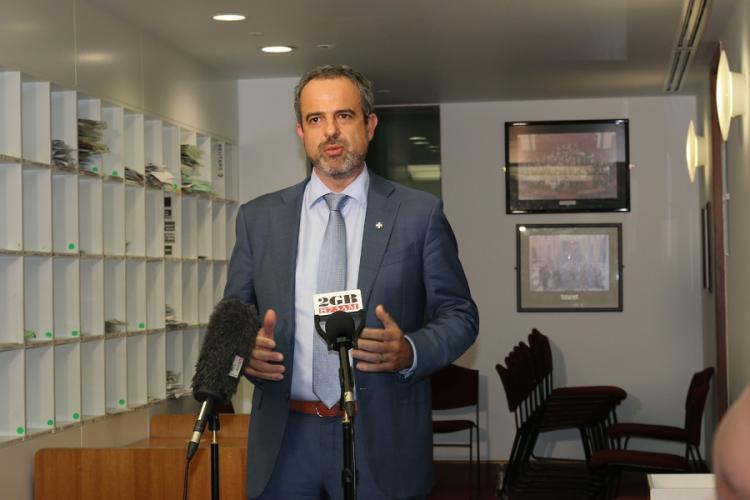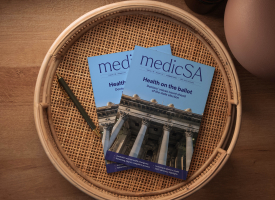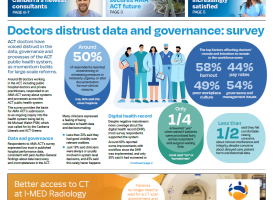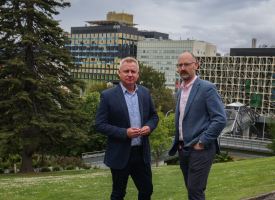AMA calls on Liberal and Labor parties to commit to 50-50 hospital funding split
AMA calls on Liberal and Labor parties to commit to 50-50 hospital funding split. AMA President Dr Omar Khorshid - ABC News Channel Friday 29 April 2022.

KIRSTEN AIKEN: The Australian Medical Association is calling on the major parties to take more action on health this election. With the campaign almost halfway through, the AMA says both Liberal and Labor are rating poorly for their lack of health policy vision. The AMA President, Dr Omar Khorshid, joins us now. Good afternoon and welcome to you. Both Coalition and Labor have published their health policies online. Anyone in our audience can go and have a look at them now. What aren't they getting right?
OMAR KHORSHID: So what they're failing to address is the really key needs of our health system. That is a recognition of the crisis in public hospitals, the fact that state governments cannot afford to run public hospitals the way they need to in order to avoid ambulance ramping, to address elective surgical waiting times, particularly post-pandemic. And of course, they're also not addressing the need for reform and investment in primary care and looking after Australians health in the community so they can avoid going to the hospital in the first place. So those are the two biggest areas where we really need to see some clear policy vision from both sides.
KIRSTEN AIKEN: Okay, we have seen a lot of money spent on health during the COVID pandemic. Let's look at a couple of initiatives that the parties have already announced. Labor has promised to deliver at least 50 Medicare urgent care clinics in an attempt to take the pressure off hospitals. That would help, wouldn't it?
OMAR KHORSHID: Well, unfortunately, it won't help the actual problem in the hospitals, which is that the patients who are sick in the emergency department, who need to get into the hospital, actually can't get a bed. They can't get into the hospital. They're the ones jamming up the ED. And it also won't fix the access to primary care and GPs that Australians are complaining about in the community. It will serve a small need, and that's those people who currently go to the emergency department with low acuity problems that could be dealt with in an urgent care centre. So we acknowledge there will be some positive impact from that, but it's not going to address these deep problems in the health system.
KIRSTEN AIKEN: Okay. The Coalition says it plans to grow Medicare funding by $4 billion in the next three years, add nearly $300 million more into its Rural Health Strategy, and that's on top of the $5 billion it says it's put in telehealth since the COVID pandemic started. Also, an attempt to get people the help they need when they need it, would you say?
OMAR KHORSHID: Well, what the Coalition are doing is basically re-announcing things that they've already done, so they're effectively sitting back on their performance over the pandemic and saying: look, we've looked after you, so trust us to continue to do that. What they're not doing is looking forward, and all the money that's gone into health during the pandemic has been about the pandemic. It's been about keeping Australians healthy during this once in a lifetime crisis that we've just been through. But it doesn't fix the underlying issues. It doesn't help address the issues that are causing Australians to get sick and die in the back of ambulances or in hospital EDs when they should be in the hospital getting looked after.
KIRSTEN AIKEN: On ambulance ramping, the budgets to hospitals are really complicated. Funding is provided from a complex mix from state, territory, and Federal Governments. If reform is needed, do you think it would make more sense to adjust that mix, or for one or the other to provide that health care in its entirety?
OMAR KHORSHID: The idea of having a single funder that actually looks after not just hospitals, but in fact primary care aged care, so you haven't got these drivers to cost shift that, that doctors and hospital administrators keep complaining about. It's pretty attractive, but it's major reform, the size of which we just don't do in this country. So we're not calling for that. We're actually trying to be realistic and saying: let's just bump up the Federal contribution to an even contribution with the states; 50/50. That is a call that's been supported by all of the states, and it would go a long way. It would actually add something like $20 billion into the health system, into the hospital system, over four years. And that's enough to make a meaningful difference, to allow the states to invest in capacity and to make sure that hospitals are delivering on the health care needs, which we know are increasing.
KIRSTEN AIKEN: And so if there was a 50/50 split, how do you think, or have you done any modelling on how that would improve patient waiting times?
OMAR KHORSHID: So what it will do- a 50/50 split adds $20 billion into the mix, and the states have assured us that they won't be pulling any money out of health, so it's extra money into the system. But of course, money isn't everything. You also need to look at the structure, the frameworks about which this funding happens to make sure that hospitals are rewarded for good performance, for actually good patient outcomes that they're able to innovate, spend money on technology, because we know technology can really help us make health more sustainable. And of course, to grow the hospital system as well. So they need to change not just the amount of money, but how it is spent, and make it more flexible so the states can do what they need to do to grow their public hospital system and to look after their communities.
KIRSTEN AIKEN: How do you think Australia's health system is comparing at the moment to like nations?
OMAR KHORSHID: So we have been pretty good in Australia. Based on our mix of a public system that is available to almost everyone, perhaps not as quickly as we want, but it's there as a backup. And of course, a private sector system which is healthy, robust, and in fact bigger in terms of elective surgery than the public system. that mix has meant that Australia gets pretty good outcomes in terms of the amount we spend and the health outcomes. But we are starting to deteriorate, particularly around access to the system. And that's really our message here. Australians are telling us they can't get to their GP. They can't get in the front door of their hospital, whether it be for surgery or when they've got an emergency. Once they get there, the care is not too bad. On a world scale, it's excellent. But we've got to allow people access to a system to keep them healthy.
KIRSTEN AIKEN: Well, you've been talking to the parties, and the Labor official campaign launch is this weekend. The Coalition's is to come. Do you expect that there is going to be another announcement on health?
OMAR KHORSHID: I certainly hope that given the fact that Labor have said that they're going to be better on Medicare than the government, we hope there's some substance behind that. I'm really looking forward to hearing the launch on Sunday and what they've actually got planned in health. We, of course, have been talking to both parties and strongly pushing the idea of actually having a vision for the future. Because right now, Australians can't see a forward vision from either party, and that must be addressed if we're going to trust them to look after our health going forward as the next government.
KIRSTEN AIKEN: Good to speak to you.
OMAR KHORSHID: Cheers.
KIRSTEN AIKEN: AMA President Dr Omar Khorshid there.



